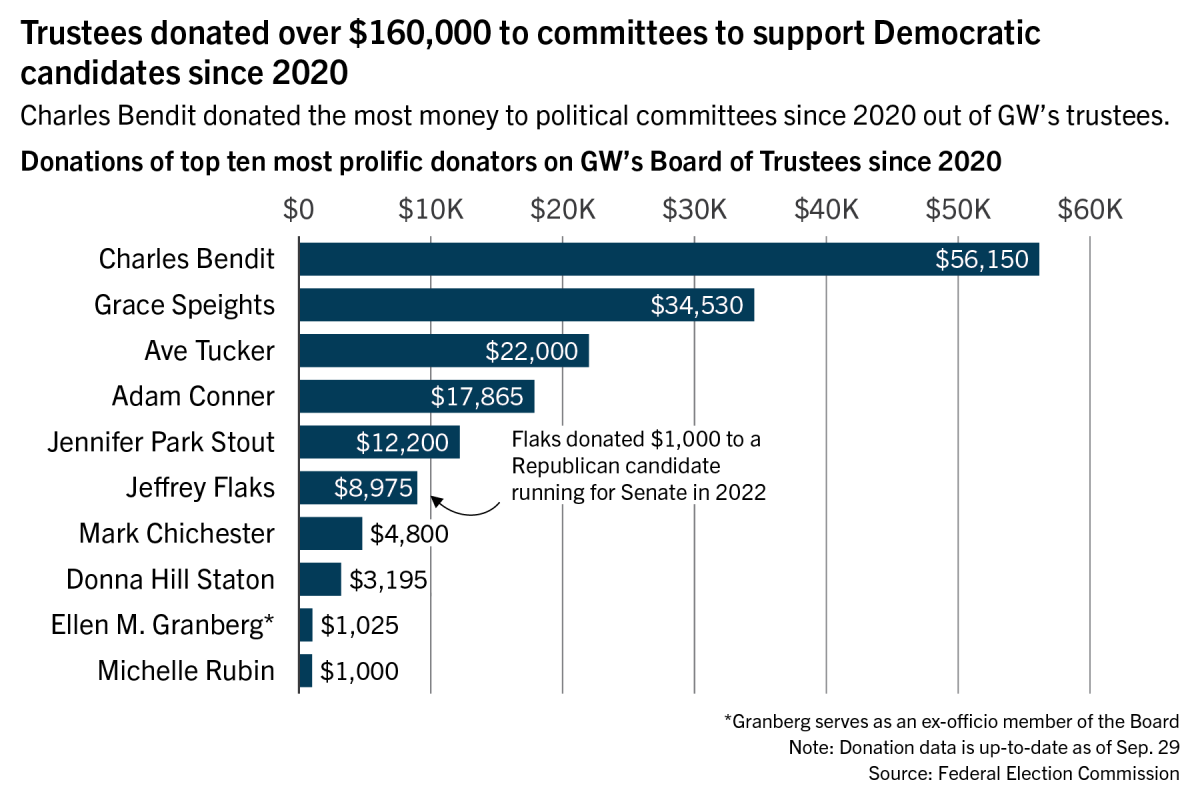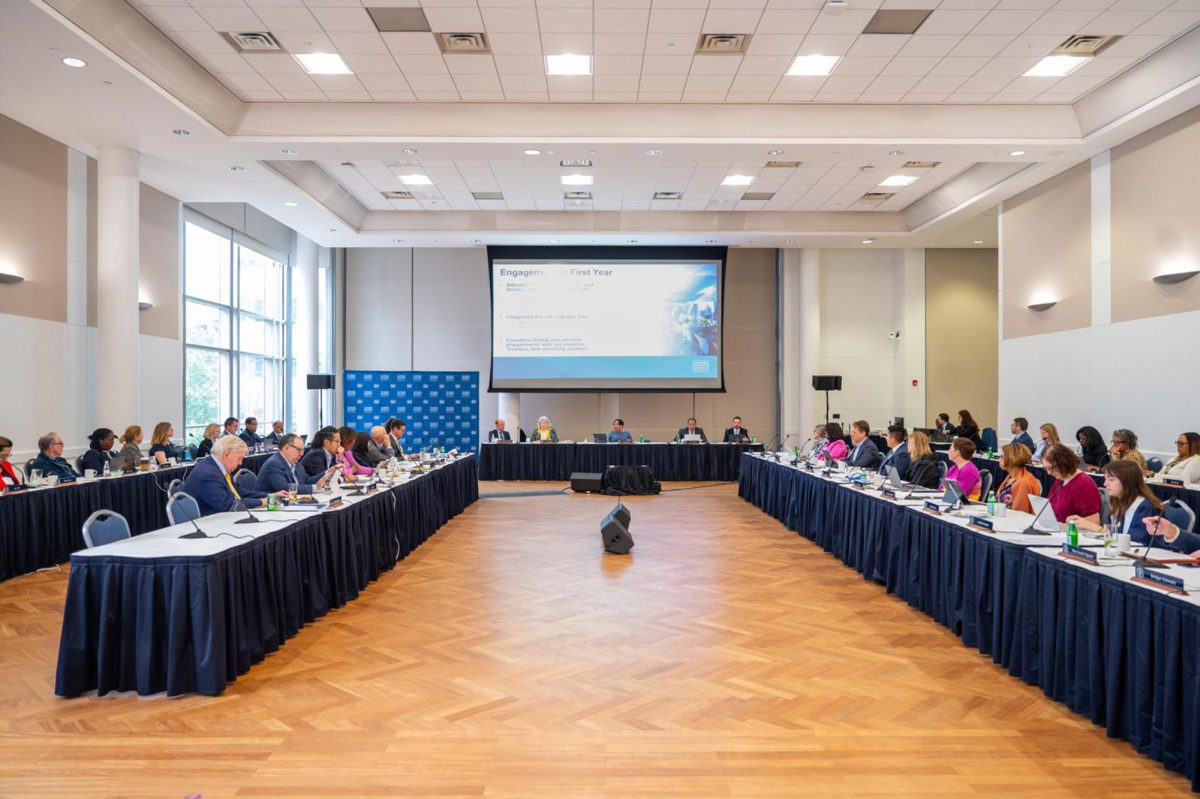More than two-thirds of the Board of Trustees, including the governing body’s three officers, have donated to Democratic campaigns and political action committees over the last four years.
Thirteen of the 20 trustees have donated between $20 and $56,150 to Democratic candidates and campaigns from 2020-24, according to a Hatchet analysis of Federal Election Commission Campaign Finance data. Experts in higher education governance said these donations can signal trustees’ political affiliations, but does not impact their decision-making processes because the Board has a legal obligation to act in the University’s best interest.
Board Chair Grace Speights, who works as a partner at Morgan, Lewis & Bockius law firm, donated $34,530 to Democratic causes since 2020, including election campaigns and the ActBlue nonprofit fundraising platform for Democrats, according to the public records. Vice Chair Mark Chichester — who serves as President of Atlas Research, a strategic consultation firm in D.C. — donated $4,800 in 2020 to President Joe Biden’s reelection campaign.
Secretary Avram Tucker, who works as Chief Executive Officer at TM Financial Forensic and lives in Orinda, California, donated $22,000 since 2020 to the Democratic Senatorial Campaign Committee and senate campaigns for Raphael Warnock and Steve Bullock.
University President Ellen Granberg, who serves as an ex-officio member of the Board, donated $1,025 in total to Democratic PACs like ActBlue and Biden’s campaign between 2020 and 2022.
Jeffrey Flaks is the only trustee who has donated to a Republican over the last four years. Flaks donated $1,000 to Republican Themis Klarides in 2022, who ran against Incumbent Richard Blumenthal for one of Connecticut’s senate seats.

Robert A. Scott, who served as president of Adelphi University and Ramapo College of New Jersey and authored the book “How University Boards Work,” said trustees prioritize protecting the University’s interests, including the institution’s independence, academic freedom and principles. He said trustees have a right to support candidates through donations, but added it may be difficult for them to separate personal politics when making University decisions because people have “political inclinations.”
The Board’s bylaws grant trustees the ability to manage, direct and govern over the University.
“They are citizens of the country, and they are free to donate to whomever they wish, as long as they do not violate the duty of loyalty to the institution,” he said.
Scott said every Board includes an audit committee that identifies and deals with potential conflicts of interest that violate these duties. He said the committee is responsible for identifying any actions, conflicts of interest or decisions that might negatively impact how the institution is perceived by the community.
GW’s Committee on Audit and Compliance consists of Charles Bendit and Jeffrey Flaks, who have donated $56,150 and $7,975, respectively, to Democratic causes since 2020.
The Board’s process surrounding the election of trustees is decided privately, with trustees being elected by current Board members to one four-year term that can be renewed for a second, per the Board’s bylaws. The FEC data on political donations is one of the only publicly available insights into their backgrounds.
Bendit, who serves as co-Chief Executive Officer of real estate firm Taconic Partners located in New York City, has donated $56,150 since 2020 to a PAC that focuses on electing a Democratic majority in the Senate, President Joe Biden’s re-election campaign and other Democratic campaigns. Bendit contributed the majority of his funds in 2020, donating $52,350 in 2020.
Trustee Adam Connor, who serves on the Committee on Academic Affairs and the Committee on Governance and Nominations, has donated $17,865 since 2020 to Biden’s reelection campaign, Vice President Kamala Harris’s election campaign and other democratic Senate campaigns. Conner works as the vice president for Technology Policy at American Progress, a public policy think tank located in D.C.
In addition to his donation to Themis, Flaks has donated $7,975 since 2020 to democratic campaigns for Congress and the American Hospital Association PAC, which is aimed at electing officials focused on America’s hospitals and health systems. Flaks sits on the Committee on Finance and Investments, and serves as the president and chief executive officer at Hartford HealthCare, a hospital network in Hartford, Connecticut.
Other trustees like Michelle Rubin, Camila Tapias and Donna Hill Staton have donated $1,000, $900 and $3,195, respectively, to Democratic presidential and congressional campaigns and democratic PACs over the last four years.
Trustees did not return a request for comment on their political donations.
Four trustees have public voting records, and all four are registered as Democrats including Grace Speights, Mark Chichester, Adam Conner and Regina James. All four have also donated to Democratic causes.
No current trustees with public records are registered as Republicans.
University spokesperson Julia Metjian said trustees are volunteers who serve as the fiduciaries and are legally bound to act in the best interest of the institution and adhere to a Trustee Conflicts of Interest Policy, which officials updated last fall to consolidate processes, modernize and align language with D.C. law and provide more clear expectations and responsibilities.
Metjian said the policy ensures that decisions are not improperly influenced by their personal, familial, business or other interests. She said trustees have a “clear criteria” for selecting individuals of the “highest integrity” to sit on the Board, electing individuals who demonstrate a “strong commitment” to devoting their knowledge, time and financial resources to benefit the University.
“The civic and political contributions that board members make in their private capacities are personal decisions,” Metjian said. “Our board members have the same rights to free expression afforded to our community of students, faculty and staff.”
Ben Hermalin, who works as the Provost of the University of California, Berkeley, said trustees’ political donations are “not cause of concern” for him. He said the Democratic Party tends to be very pro-labor, but trustees’ political ideations likely will not influence how they think about issues like unionized labor at GW because they have a legal responsibility to act solely in the University’s best interest.
He said if trustees used their University governing power or resources to advance the political agenda of the Democratic Party, this would violate their legal responsibility to GW, but he’s “sure” trustees are not abusing their position.
“They have a fiduciary responsibility to think about things from a different perspective,” Hermalin said.
Sondra Barringer, an associate professor of education policy and leadership at Southern Methodist University, said there is less evidence that suggests partisan behaviors are occurring among trustees at private institutions because trustees are appointed by current trustees. She said there is typically more political bias at public institutions because trustees are typically appointed by the governor or state legislature.
Barrett Taylor, a professor of counseling and higher education at the University of North Texas, said the concept of a Board member’s fiduciary duties is “pretty broad.” He said private universities are much more connected to industry and some specific firms through their trustees than those at public universities are, and given the University’s location in the District, trustees are very connected to politics and power.
Four trustees work in finances and investment firms, while two work in real estate and two work in law.
“Is the trustee executing their fiduciary role faithfully or not is a very sticky question to answer,” Taylor said.
Demetri Morgan, an associate professor of education at the University of Michigan, said whether or not trustees’ political donations and political leanings impact their governance is “contextual,” and depends on the topic and the current state of national politics. He said what matters most is how the Board engages with shared governance — the participation of faculty, students and staff in decision-making — and communicates with stakeholders, because many Board decisions are seen as binary.
The Faculty Senate Executive Committee Chair, Staff Council President, Student Government Association President and Alumni Association President are present at Board meetings and deliver reports.
Trustees unanimously approved a set of principles to improve shared governance and collaboration at the University in May 2022, which mandated that trustees “periodically” review the University president’s commitment to GW’s system of shared governance through biyearly surveys, biannual meetings with the Faculty Senate executive committee and annual evaluations of the University president.
“I think the bigger question that’s kind of beyond this is what are the processes that boards are engaging in that leads them to more than binary choices, and to what extent were those fully vetted and brought to the floor,” Morgan said.
Natalie Note contributed reporting.





